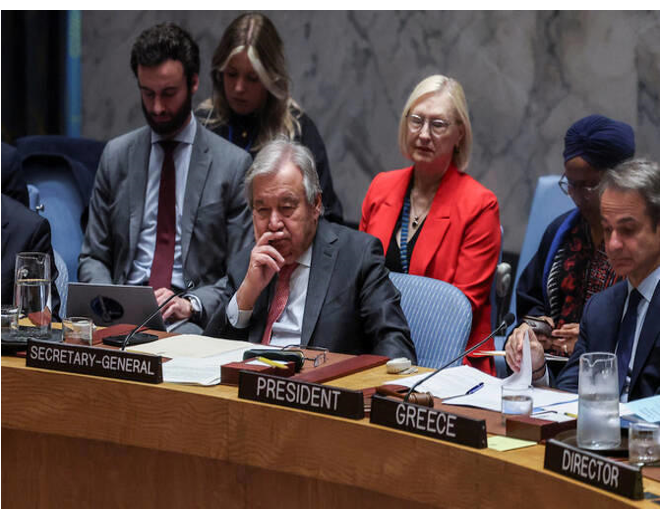By Mohamed Ghani
Addis Ababa – United Nations Secretary-General Antonio Guterres has issued a stark warning regarding the escalating threats to global maritime security, emphasizing that this insecurity undermines overall global stability. Addressing a high-level Security Council meeting, Guterres stressed the critical importance of safeguarding the world’s oceans and seas, impacting everything from the air we breathe to global trade and jobs.
“Without maritime security, there can be no global security,” Guterres declared, highlighting the interconnectedness of maritime safety and overall international peace. He noted that maritime spaces are facing increasing pressure from traditional challenges and newly emerging dangers, including contested boundaries, resource depletion, escalating geopolitical tensions, and transnational crime.
The Secretary-General pointed out a worrying trend: after a brief decline in piracy and armed robbery in 2024, the first quarter of 2025 witnessed a sharp 47.5% increase in reported incidents compared to the previous year, according to the International Maritime Organization. This surge was particularly pronounced in Asia, notably in the Straits of Malacca and Singapore.
Guterres also highlighted the significant disruptions caused by Houthi attacks on commercial vessels in the Red Sea and Gulf of Aden, exacerbating tensions in an already unstable region. He further addressed the ongoing challenges in the Gulf of Aden and the Mediterranean, which remain active routes for migrant smuggling, weapons trafficking, and human trafficking. The Gulf of Guinea continues to struggle with a range of maritime crimes, including piracy, kidnappings, oil theft, and illegal fishing, as well as the trafficking of drugs, weapons, and people.
The UN Chief also raised concerns about the increasing use of maritime routes for drug trafficking, specifically mentioning heroin from Afghanistan reaching East Africa via the Indian Ocean, and cocaine flowing through the coasts of the Western Hemisphere to West Africa and European ports.
Adding to the complexity, Guterres identified cyber-attacks as a fast-growing threat to the security of ports and shipping companies.
To combat these challenges, Guterres emphasized the crucial role of international law, with the UN Charter and the Convention on the Law of the Sea serving as the foundation for maritime security. He called on all states to fully implement their obligations under international law and resolve maritime disputes peacefully, in accordance with the UN Charter.
The Secretary-General urged for collaborative partnerships to strengthen maritime security, involving all stakeholders. He emphasized the need for enhanced coordination and stronger maritime governance to address the increasingly complex and interconnected threats. Furthermore, he stressed the importance of supporting developing countries by building their capacity to tackle these threats through technology, training, judicial reforms, modernized naval forces, marine police units, maritime surveillance, and port security.
“We must involve everyone with a stake in maritime spaces,” Guterres stated.
Reaffirming the UN’s commitment to supporting the Security Council and all member states, Guterres concluded with a call to action: “Let’s take action to support and secure maritime spaces, and the communities and people counting on them.”









